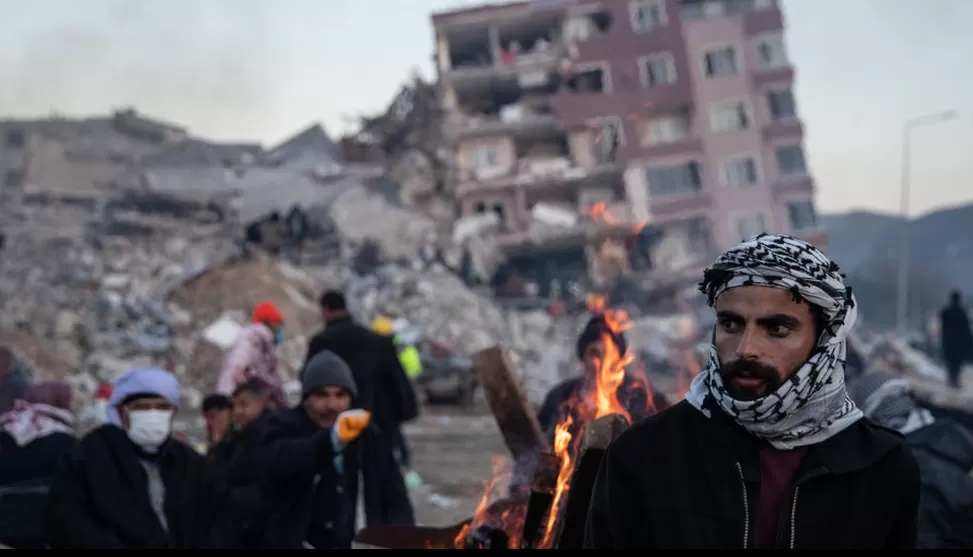Turkey-Syria earthquake: Freezing weather adds to despair as quake toll passes 21,000

KAHRAMANMARAS, Turkey (AP) — A teenager was pulled largely unscathed from beneath the rubble of a collapsed building in the Turkish city of Gaziantep early Friday, but four days after a catastrophic earthquake killed more than 20,000 the possibility of finding more survivors was rapidly shrinking.
KAHRAMANMARAS, Turkey (AP) — A teenager was pulled largely unscathed from beneath the rubble of a collapsed building in the Turkish city of Gaziantep early Friday, but four days after a catastrophic earthquake killed more than 20,000 the possibility of finding more survivors was rapidly shrinking.
The 7.8 magnitude earthquake hit the border region between Turkey and Syria, an area home to more than 13.5 million people, early Monday morning. With morgues and cemeteries overwhelmed, bodies lay wrapped in blankets, rugs and tarps in the streets of some cities.
Temperatures remain below freezing across the large region, and many people have no place to shelter. The government has distributed millions of hot meals, as well as tents and blankets, but was still struggling to reach many people in need.
Mustafa Turan rushed to his hometown of Adiyaman from Istanbul hours after the quake struck to check on his relatives. He counted 248 collapsed buildings between the airport and the city center. The journalist said Friday that 15 of his relatives had been killed, and scores of people were sleeping outside or in tents.
“At night, about 4 a.m., it got so cold that our drinking water froze,” he said. Turkey’s disaster management agency said 18,342 people had been confirmed killed in the disaster so far in Turkey, with nearly 75,000 injured. No figures have been released on how many have been left homeless, but the agency said more than 75,000 survivors have been evacuated to other provinces.
More than 3,300 have been confirmed killed on the other side of the border in war-torn Syria, bringing the total number of dead to more than 21,600.
Before dawn in Gaziantep, near the epicenter of the quake in Turkey, rescuers pulled Adnan Muhammed Korkut from the basement where had been trapped since the temblor struck Monday. The 17-year-old beamed a smile at the crowd of friends and relatives who chanted “Adnan,” “Adnan,” clapping and crying tears of joy as he was carried out and put onto a stretcher.
“Thank God you arrived,” he said, embracing his mother and others who leaned down to kiss and hug him as he was being loaded into an ambulance. “Thank you everyone.” “I was able to survive that way,” he said.
“I have a son just like you,” a rescue worker, identified only as Yasemin, told him after giving him a warm hug. “I swear to you, I have not slept for four days. I swear I did not sleep; I was trying to get you out.”
The death toll from the earthquake, which Turkish Turkish President Recep Tayyip Erdogan has called “the disaster of the century,” has eclipsed the more-than 18,400 who died in the 2011 earthquake off Fukushima, Japan, that triggered a tsunami and the estimated 18,000 people who died in a temblor near Turkey’s largest city, Istanbul, in 1999.
Overall, Turkey has said that some 6,500 buildings are confirmed to have collapsed in the quake.
Aerial footage from over the earthquake zone in Turkey revealed entire neighborhoods of high-rises reduced to twisted metal, pulverized concrete and exposed wires. Even though experts say trapped people could survive for a week or more, the chances of finding survivors in the freezing temperatures are dimming. As emergency crews and panicked relatives dug through the rubble — and occasionally found people alive — the focus began to shift to demolishing dangerously unstable structures.
In Kahramanmaras, the city closest to the epicenter, a sports hall the size of a basketball court served as a makeshift morgue to accommodate and identify bodies.
In northwestern Syria, the first U.N. aid trucks since the quake to enter the rebel-controlled area from Turkey arrived Thursday, underscoring the difficulty of getting help to people there.
The winter weather and damage to roads and airports have hampered the response. Some in Turkey have complained that the government was slow to respond — a perception that could hurt Erdogan at a time when he faces a tough battle for reelection in May. Erdogan has been visiting affected cities over the last two days.
With the majority of Turkey’s media under the control of the government, television stations have been mainly focusing on rescue efforts, with hardly any reports on the hardship suffered on the ground.
Turkey’s disaster-management agency said more than 120,000 rescue personnel were now taking part in the effort and more than 12,000 vehicles, including tractors, cranes, bulldozers and excavators had been shipped.
The Foreign Ministry said 95 countries have offered help, and nearly 7,000 rescue personnel had been sent to assist.